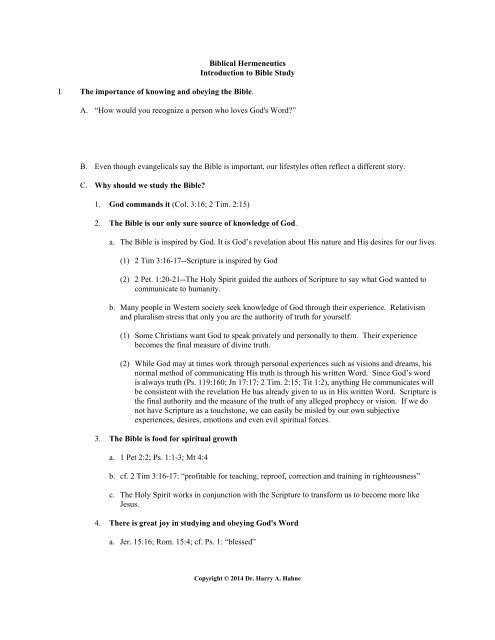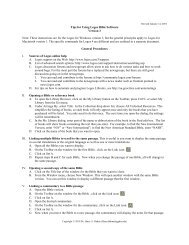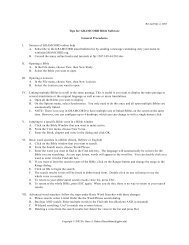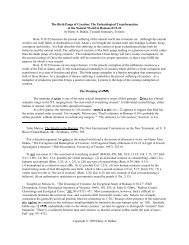Biblical Hermeneutics Introduction to Bible Study I ... - Balboa Software
Biblical Hermeneutics Introduction to Bible Study I ... - Balboa Software
Biblical Hermeneutics Introduction to Bible Study I ... - Balboa Software
You also want an ePaper? Increase the reach of your titles
YUMPU automatically turns print PDFs into web optimized ePapers that Google loves.
<strong>Biblical</strong> <strong>Hermeneutics</strong><strong>Introduction</strong> <strong>to</strong> <strong>Bible</strong> <strong>Study</strong>I. The importance of knowing and obeying the <strong>Bible</strong>.A. “How would you recognize a person who loves God's Word?”B. Even though evangelicals say the <strong>Bible</strong> is important, our lifestyles often reflect a different s<strong>to</strong>ry.C. Why should we study the <strong>Bible</strong>?1. God commands it (Col. 3:16; 2 Tim. 2:15)2. The <strong>Bible</strong> is our only sure source of knowledge of God.a. The <strong>Bible</strong> is inspired by God. It is God’s revelation about His nature and His desires for our lives.(1) 2 Tim 3:16-17--Scripture is inspired by God(2) 2 Pet. 1:20-21--The Holy Spirit guided the authors of Scripture <strong>to</strong> say what God wanted <strong>to</strong>communicate <strong>to</strong> humanity.b. Many people in Western society seek knowledge of God through their experience. Relativismand pluralism stress that only you are the authority of truth for yourself.(1) Some Christians want God <strong>to</strong> speak privately and personally <strong>to</strong> them. Their experiencebecomes the final measure of divine truth.(2) While God may at times work through personal experiences such as visions and dreams, hisnormal method of communicating His truth is through his written Word. Since God’s wordis always truth (Ps. 119:160; Jn 17:17; 2 Tim. 2:15; Tit 1:2), anything He communicates willbe consistent with the revelation He has already given <strong>to</strong> us in His written Word. Scripture isthe final authority and the measure of the truth of any alleged prophecy or vision. If we donot have Scripture as a <strong>to</strong>uchs<strong>to</strong>ne, we can easily be misled by our own subjectiveexperiences, desires, emotions and even evil spiritual forces.3. The <strong>Bible</strong> is food for spiritual growtha. 1 Pet 2:2; Ps. 1:1-3; Mt 4:4b. cf. 2 Tim 3:16-17: “profitable for teaching, reproof, correction and training in righteousness”c. The Holy Spirit works in conjunction with the Scripture <strong>to</strong> transform us <strong>to</strong> become more likeJesus.4. There is great joy in studying and obeying God's Worda. Jer. 15:16; Rom. 15:4; cf. Ps. 1: “blessed”Copyright © 2014 Dr. Harry A. Hahne
. There is great joy in discovering God's truth in the <strong>Bible</strong> for yourself.<strong>Hermeneutics</strong>: <strong>Introduction</strong> Page 2c. There is also great joy in obedience <strong>to</strong> the Word: James 1:22, 25--blessed is the person who doeswhat is in the Word, not simply the one who hears it.II.Some helpful attitudes in <strong>Bible</strong> studyA. The <strong>Bible</strong> is God's love letter <strong>to</strong> humanity (Ps. 119:72, 97).1. This attitude gives us hunger <strong>to</strong> read and study God's word and helps keep us from being threatenedby changes in our lives that the <strong>Bible</strong> demands.B. Worship (Ps. 119:12).1. <strong>Bible</strong> study should not be simply an intellectual exercise, but a way of coming <strong>to</strong> know God betterand <strong>to</strong> bring glory <strong>to</strong> Him.2. Come <strong>to</strong> the Word with an attitude of praise and prayer.C. Reliance on the Holy Spirit <strong>to</strong> teach you (Ps. 119:18).1. Illumination: The Holy Spirit opens our eyes <strong>to</strong> see the truth in Scripture. He convicts us of sin andshows us how <strong>to</strong> apply the teachings of the <strong>Bible</strong> <strong>to</strong> our lives.a. 2 Cor 4:4-6: Satan blinds people's minds so they cannot see the truth of the Gospel but the HolySpirit opens their eyes and shines the light of truth in their hearts..b. 1 Cor 2:14--the Holy Spirit enables a spiritual person <strong>to</strong> see the truth God has revealed.Unbelievers have a distinct disadvantage in understanding spiritual truth in Scripture.2. This does not mean that we have no need <strong>to</strong> use careful techniques for studying the <strong>Bible</strong>. The HolySpirit works in conjunction with our careful study of Scripture. Good study techniques help keep usfrom reading our own ideas in the <strong>Bible</strong> and then assuming God showed it <strong>to</strong> us.3. Illumination is especially important for application. The Holy Spirit opens our hearts <strong>to</strong> see how <strong>to</strong>apply the <strong>Bible</strong> <strong>to</strong> <strong>to</strong>day's world and our personal needs.D. Expectancy (Ps. 119:38).1. Believe that God is going <strong>to</strong> teach you and guide you <strong>to</strong> personal application of His WordE. Willingness <strong>to</strong> obey (Ps. 119:33).1. A prerequisite for knowing the truth is the willingness <strong>to</strong> do it (Jn 7:17).2. The goal of <strong>Bible</strong> study is a changed life (James 1:22-25).F. Perseverance1. Some concepts in the <strong>Bible</strong> are very difficult <strong>to</strong> understand and only yield their meaning withprayerful, diligent study.
<strong>Hermeneutics</strong>: <strong>Introduction</strong> Page 3III.Overview of inductive <strong>Bible</strong> studyA. Inductive <strong>Bible</strong> <strong>Study</strong> seeks <strong>to</strong> discover the author's intended meaning in a passage by examining thedetails of a passage within the contextB. Deductive study begins with an idea and tries <strong>to</strong> find support for it in Scripture. It runs the risk oftwisting Scripture <strong>to</strong> fit your ideas (“proof texting”), rather than letting your ideas be shaped by the <strong>Bible</strong>.C. Three basic steps in <strong>Bible</strong> study: Observation, Interpretation, Application1. Observation: “what does it say?”a. Simply list the facts without trying <strong>to</strong> understand what they mean.b. Record as many details as you can. You never know what will be an important clue <strong>to</strong> themeaning.c. Write it down. This forces you <strong>to</strong> focus more. You also can reexamine the details later when youinterpret the passage.d. The more careful you are in observation the more likely your interpretation will be correct.e. Too many people leap <strong>to</strong> interpretation or application before they have gathered all the facts.This can lead <strong>to</strong> interpretive errors.2. Interpretation: “what does it mean?”a. What is the author trying <strong>to</strong> communicate with the words he chose? The only correctinterpretation is the author's intended meaningb. Interpretation finds what the passage meant for the original readers as well as timeless principlesimplied by the passage.c. We determine the correct interpretation from the details we observe in the text.3. Application: “How does this relate <strong>to</strong> my life?”a. How should my attitudes, behavior and beliefs be changed as a result of the truths this passageteaches?b. There is only one correct interpretation of a statement, but there are many applications.(1) E.g. Eph 5:20: Interpretation: Christians should always thank God for what happens in theirlives. Applications: Thank God for losing a job or receiving an unexpected source of moneyfor school.4. This process is how the mind naturally works, although we normally move from step <strong>to</strong> step withoutbeing conscious of the process. By taking the discipline <strong>to</strong> slow up these natural steps andmethodically take one step at a time, it is easier <strong>to</strong> avoid jumping <strong>to</strong> unwarranted conclusions. It alsohelps you understand why you believe a certain interpretation.
<strong>Hermeneutics</strong>: <strong>Introduction</strong> Page 4D. Illustrations of the inductive method:1. Luke 18:1 (NASB): “Now he was telling them a parable <strong>to</strong> show that at all times they ought <strong>to</strong> prayand not <strong>to</strong> lose heart”a. Observations:(1) Jesus desires people always <strong>to</strong> pray.(2) He used a parable <strong>to</strong> teach this.(3) Jesus wants people <strong>to</strong> not “lose heart” in prayer.b. Interpretations:(1) To not lose heart means not <strong>to</strong> get discouraged.(2) One might be tempted <strong>to</strong> get discouraged and give up in prayer when answers <strong>to</strong> prayer donot come as quickly as we would like.(3) This seems <strong>to</strong> imply perseverance. Keep asking God, even when answers do not come.c. Application:(1) My brother is not a Christian. I need <strong>to</strong> keep praying with perseverance for his salvation andnot be discouraged because he seems <strong>to</strong> reject the gospel2. Mark 14:32-34:Observations Interpretations Applications1. Jesus prayed thesame request severaltimes (36, 39, 41)2. Jesus made aspecific request (36)3. Nevertheless, Jesussaid, “Yes, not what Iwill, but what youwill” (36)1. It is not wrong <strong>to</strong> pray thesame request many times,until you get an answer.2, 3. Jesus was submissive,despite his definite desires.-He was willing <strong>to</strong> do whatthe Father wanted and <strong>to</strong>accept the Father’s answer <strong>to</strong>prayer-Principle: we need <strong>to</strong> besubmissive and humble inprayer and be willing <strong>to</strong> obeyGod’s will.2,3. I need <strong>to</strong> develop an attitude of greater humble willingness<strong>to</strong> be obedient <strong>to</strong> God’s will, regardless of what he may want.*Implementation plan:a. Pray for a change in attitudec. Meditate on biblical promises that will build my confidencethat God’s will is indeed the best (e.g. Rom. 12:2)b. Begin by obeying God in areas I already know are His will(name a specific one)
<strong>Hermeneutics</strong>: <strong>Introduction</strong> Page 5E. Read James 1:2-4 in the NIV. Indicate whether the following statements are observations,interpretations, or applications.James 1:2-4: Consider it pure joy, my brothers, whenever you face trials of many kinds, 3 because youknow that the testing of your faith develops perseverance. 4 Perseverance must finish its work so that youmay be mature and complete, not lacking anything.___ The testing of faith produces perseverance.___ “Perseverance” is repeated twice in the passage.___ Perseverance means not getting discouraged or giving up, no matter what happens.___ I need <strong>to</strong> rejoice and thank God for my present financial problems.___ Maturity has <strong>to</strong> do with Christ-like character, such as the fruit of the Spirit (Gal. 5:22-23)___ The passage commands the readers <strong>to</strong> have joy in trials.___ The reason we should have joy in trials is that faith develops perseverance.___ Trials are a means of testing faith.___ “So that” (v. 4) expresses a result.___ I am <strong>to</strong>o easily discouraged when disappointments come and I tend <strong>to</strong> blame God for my problems.I will share this struggle with my <strong>Bible</strong> <strong>Study</strong> Group, so they can pray for me.






